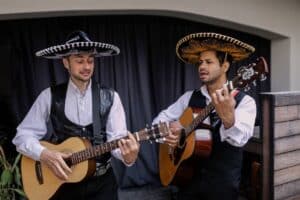
83 Spanish Words We Use in English All the Time
Spanish has contributed a lot of culture—and a lot of words—to English.
Beyond incredible contributions like flamenco and tapas, we use at least 83 Spanish words that mean basically the same thing in English today. Check out the words below to see if you use any of them (I have a feeling you do).
Contents
- Spanish Words for People in English
- Spanish Animal Words in English
- Spanish Clothing Words in English
- Spanish Place Words Used in English
- Spanish Food and Drink Words in English
- Spanish Music and Dance Words Used in English
- Other Spanish Words in English
- Spanish Weather and Nature Words in English
- Spanish Words In English That Are Actually Aztec
- And One More Thing…
Download: This blog post is available as a convenient and portable PDF that you can take anywhere. Click here to get a copy. (Download)
Spanish Words for People in English
1. Aficionado
In English, it’s someone who is very interested in and enthusiastic about a particular subject. I have seen an increase in the use of this word in English lately. You used to have football fans, now you have sports aficionados.
What is funniest for me is the fact that in Spanish we more often use the word “fan” than “aficionado.”
2. Amigo
In English, “amigo” is used to address or refer to a friend predominantly in Spanish-speaking areas. “Amigo” comes from the Spanish word amigo, which comes from the Latin word amicus (friend), which is derived from the verb amare (to love). Maybe this is why we love everybody in Spain!
3. Buckaroo
The word “buckaroo” comes from Spanish vaquero (cowboy), which is a person who manages cattle while mounted on horseback. The word vaquero derived from the word vaca (cow), which was borrowed from Latin (vacca — cow).
4. Cannibal
In English, a cannibal is a person who eats the flesh of other human beings. “Cannibal” comes from the Spanish word caníbal, which is just a variation of the word caríbal, which in turn derives from the word Caribe (Caribbean, Carib).
5. Conquistador
“Conquistador” comes from Spanish conquistador, which is derived from conquista (conquest). Conquista was the result of borrowing the Latin word conquisita, which means “conquest.”
6. Desperado
“Desperado” is an adaptation of the Spanish word desesperado, which means desperate.
By the way, check out these Spanish-speaking singers and listen to Marta Sánchez’s song “Desesperada.” Sexy at its best!
7. Matador
“Matador” literally means “a person who kills.” It comes from the Spanish infinitive matar (to kill, to slaughter).
Curiously enough, people in Spain tend to avoid using the word matador. They normally say torero (bullfighter), which is basically a person who fights toros (bulls).
8. Peon
“Peon” comes from Spanish peón, which is used to describe any type of laborer. Imagine a person who has to work hard to earn their money, who comes home full of dirt and tired as a mug. There you have your peón.
9. Mulatto
A person of mixed white and Black ancestry (though this term is now often considered outdated and offensive). The term was coined by the Spanish when they had Latin American colonies, when it meant a person who was of mixed Spanish and indigenous race.
10. Patron
A person who gives financial or other support to a person, organization or cause. This word comes from the Spanish patrón, which means more like “employer,” “boss,” or “owner.”
11. Guerilla
The word “guerrilla” refers to a small, independent group of fighters who use irregular, unconventional tactics to fight larger traditional military forces.
In Spanish, guerrilla literally translates to “little war,” derived from the word guerra which means “war.”
12. Renegade
This word, from the Spanish renegado, is someone who has rejected or abandoned their previous affiliations, beliefs or loyalties, especially in favor of opposing or radically different ones.
13. Vigilante
In Spanish, the word vigilante refers to a guard or watchman. It comes from vigilar (to watch). In English, the meaning has changed to someone taking the law into their own hands.
Spanish Animal Words in English
14. Albatross
It’s a large white bird with long, strong wings that lives near the sea.
Arabic had the word al-gattas, which means “the diver.” From there, Spanish got the word alcatraz (gannet), which entered English as albatross. Then a weird thing happened, Spanish borrowed this word back from English, thus giving us our present-day Spanish albatros!
15. Burro
The Spanish burro derived from Latin burricus, which means “small horse.”
16. Zorro
“Zorro” comes from the Spanish zorro, which is “fox.” Foxes are known for being clever, and you can say of someone that they are un zorro because they are just too smart!
17. Mosquito
This word literally means “little fly,” but in both English and Spanish, it’s used to describe those annoying blood-sucking insects that come out in summer evenings.
18. Bronco
“Bronco” can mean unbroken horse (which is also its English meaning), but it can also be used to describe a person that’s considered rough or unsophisticated.
19. Alligator
This English word is derived from the Spanish el lagarto, which simply means “the lizard.”
20. Armadillo
Meaning “little armored one” in Spanish, “armadillo” is used to describe those cute little armored mammals that are common to see in the southern parts of North America.
21. Barracuda
The name for these scary fish, famous for their ability to eat flesh from the bone very quickly, originated from old Spanish, though the exact origin of the word is still unknown.
22. Cockroach
This horrible English word is simply an Anglicization of the Spanish cucaracha.
23. Mustang
A mustang is a free-roaming horse that commonly lives in the American West. They’re thought to be the distant relatives of the horses Spanish conquistadors brought from Spain. The word comes from the Spanish mustango, which comes from mesteño, meaning “untamed.”
Spanish Clothing Words in English
24. Bandolier
The word “bandolier” comes from the Spanish bandolera, which is a band that crosses from one shoulder to the opposite hip where a bandolero (someone who wears a bandolera, i.e., probably a bandit) used to put their weapons.
However, if you wear something across your chest nowadays, you say in Spanish llevar algo en bandolera (to carry across the shoulder).
25. Sombrero
The word comes from Spanish sombrero, which means, literally, “shade maker.” Easy!
26. Poncho
A type of outer garment designed to keep the body warm, traditionally made from sheep, llama or alpaca wool and worn in South America, especially in the Andes region where it gets quite cold. The Spanish word for this, which in turn is derived from Quechua punchu, is spelled the same as in English—poncho.
27. Cape
“Cape” is derived from capa, which in turn comes from Latin cappa, a term used for any type of head covering. As you have probably guessed by now, cappa is also the word where “cap” comes from. A great example of how a single word can sometimes be used to create two or more new words!
28. Bolero
English uses this Spanish word for a short jacket that is open at the front, often worn by both men and women, and often seen worn by old school servers in Mexican restaurants these days.
29. Sarape
We also used this Spanish word, which means a long blanket-like shawl, often brightly colored and fringed at the ends. The garment originated in Mexico, but is now widely worn, especially at the beach.
Spanish Place Words Used in English
30. Bodega
“Bodega” comes from Spanish bodega (cellar), which derived from Latin-Greek apotheca. It is interesting that the word apotheca entered many other languages with the meaning of “pharmacy” (take as an example the Polish word apteka — pharmacy).
31. Hacienda
The word hacienda, meaning “estate,” comes from the Old Spanish word fazienda. There are a lot of Spanish words starting with h- that used to begin with f- in Old Spanish.
32. Plaza
This Spanish word, which means “public square” (often with a fountain in the middle and with landmarks surrounding it like churches or government buildings), has worked its way into English with the same meaning.
33. Patio
Who doesn’t love to sit around on a pretty patio with friends and a tropical drink? This outdoor area, often surrounded by plants or a protective fence, has maintained its Spanish meaning in English.
34. Cafeteria
Cafetería is the longer Spanish word for café, (cafe). Just like in English, though, it’s also used for the eating areas of places like schools or office buildings.
35. Barrio
Although this word just means “neighborhood” in Spanish, in English it often refers to a neighborhood or area that is unsafe, or at least thought of as unsafe by locals.
36. Mesa
The Spanish word for “table” commonly refers to a landform that has a flat, table-like summit area and steep, cliff-like sides.
37. Ranch / Rancho
In Spanish, a rancho is a large agricultural estate, often with horses or cows, but in English, the word came to mean a simple rural house, usually with one level.
38. Canyon
English has taken this Spanish word and changed the spelling. It describes a deep gorge, typically one with a river flowing through it, derived from the Spanish cañón.
39. Playa
The Spanish word for beach has gradually been used by English speakers, especially in places with large Spanish speaking populations, like California.
It’s also been made famous by being the name of the desert area where the Burning Man festival takes place.
Spanish Food and Drink Words in English
40. Chorizo
A chorizo is a spiced pork sausage probably known worldwide.
That being said, there is another meaning of the word that is not so delicious. A chorizo is a thief, and it has been consistently used to describe some Spanish politicians in the past few years.
41. Daiquiri
“Daiquiri” comes from the name of a port city in Eastern Cuba.
Daiquiris contain rum, a lot of rum. Cuba’s most famous alcoholic drink is rum… I am just connecting some dots here.
42. Oregano
“Oregano” entered English via Spanish orégano, which means “oregano” or “marjoram.”
43. Tapas
The word tapas comes from the word tapar (to cover). Back in the Middle Ages, when you could not find a single tavern without flies, these little insects had a tendency to taste the drinks served. I guess they got drunk and died inside the beverage… Until one smart person thought it would be interesting to cover the glass with something in between sips. They started using a loaf of bread, then chorizo was added… You can imagine the rest.
If you want to know other curious facts about the origin of tapas, I recommend you visit this page.
44. Vanilla
“Vanilla” comes from Spanish vainilla, which in turn comes from Latin vaina (pod).
As you may already know, the Spanish suffix -illo/-illa is used as a diminutive, so a vainilla would be a small vaina.
45. Taco
This word, which comes from Mexican Spanish, has become one of the world’s most popular street foods.
46. Burrito
This word, which means “little burro” or “little donkey” in Spanish, has also turned into one of the world’s most popular street foods. If you’ve never had one, think of it like a fat taco, with rice, beans, cheese and sometimes meat, all wrapped in a flour tortilla wrap.
47. Jalapeño
Literally, “jalapeño” means “from Jalapa” or “from Xalapa,” which is the capital city of the state of Veracruz in Mexico. Today, the entire world knows and loves this green pepper for its spicy freshness.
48. Churro
This long, ridged fried dough snack can be served both savory and sweet. It’s often dipped into a cup of thick chocolate. English has adopted the same term for this snack.
49. Gazpacho
The cold tomato-based soup from Spain kept its Spanish name when it immigrated to English-speaking countries.
50. Salsa
Meaning “sauce” in Spanish, in English, it usually refers to a Mexican style salsa, which often contains tomatoes, onions and some type of hot peppers.
51. Tortilla
This word means “little cake” in Spanish and it refers to two very different foods in Spanish. In Spain, tortilla is an egg-based omelet, while in Latin America, it usually means a corn or wheat-based wrap used for tacos and burritos.
In English, the Latin American meaning is more common, although most people also know the continental Spanish definition.
52. Margarita
This sweet-and-sour tequila-based cocktail that’s popular at Mexican restaurants has a mysterious origin.
One theory is that the drink has the bright, cheerful appearance of a margarita, which is the Spanish word for “daisy.”
Another theory is that the cocktail is named after Margarita Sames, a socialite from Dallas, Texas. According to this version, she created the cocktail for her guests at a party at her vacation home in Acapulco in 1948.
53. Fajita
The word “fajita” is derived from the Spanish word faja, which means “strip” or “belt.” The term “fajita” literally means “little strip” or “little belt,” which refers to the strips of meat that are typically used in the delicious Mexican dish.
Spanish Music and Dance Words Used in English
54. Flamenco
Flamenco is one of those music genres you either love or hate. Even people from the South of Spain, where flamenco originated, are divided into flamenco lovers and flamenco… not lovers.
The word flamenco is used to define a type of music and dance performed mainly by people of Gypsy origin. The word flamenco comes from the Middle Dutch word vlaminc (which means “from Flanders”), because in the past there was a theory that said Gypsies were of Germanic origin.
55. Rumba
“Rumba” comes from Spanish rumba, which is that impossible dance all my friends have mastered to perfection and I am not even able to describe.
If you like rumba, I really recommend you get familiar with the rumba catalana. I love it!
56. Tango
“Tango” is one of those sexy words the Spanish language has given the world. For free.
Whether you know how to dance a tango or not, just remember it is a word of Spanish origin. If you want to pronounce it correctly in Spanish, it should be said tan-goh.
Other Spanish Words in English
57. Fiesta
I still have not met a person in the whole world who does not know or has not heard about the word “fiesta.”
What is true is that the word “fiesta” entered English through Spanish. We also have fiesta (party), which comes from Latin festa.
58. Siesta
“Siesta” comes from Latin sexta hora (the sixth hour). The sixth hour refers to the prayer time at noon (six hours after dawn), but Spanish siesta starts after eating lunch, which can normally be 3 or 4 p.m.
If you are in Spain, bear in mind that most shops are closed during siesta time, which means if you need to buy something, you will have to wait until around 6 p.m.!
59. Adobe
“Adobe” is written exactly the same in both English and Spanish. “Adobe” comes from the Arabic word al-tob, which means something along the lines of “mud brick.”
There is one difference between the English and the Spanish, though: pronunciation. Remember that in Spanish we normally read words exactly how they are written, so we say ah-dóh-beh.
60. Crusade
Crusade is a blend of the Middle French croisade and Spanish cruzado. Both words came from Latin crux/crucis (cross).
Maybe you can understand now why the Stations of the Cross, or the Way of the Cross, are called Via crucis, and how the word crusade has developed the meaning it has today from its place in history.
61. Galleon
Galleon comes from Spanish galeón, which is a large sailing ship with three or more masts.
It is interesting how the word in Spanish has its accent on the last syllable, while in English it is on the first one.
62. Lolita
I was so surprised when I discovered this word is actually of Spanish origin!
Lolita is the diminutive form of Lola, which in turn is short for Dolores (a female proper noun meaning “pains, sorrows”). That this word, closely related to religion, ended up meaning what it means today is strange to say the least.
63. Telenovela
The word telenovela is a fusion of two Spanish words: televisión (TV) and novela (novel). Watching a telenovela is indeed like watching a book be played out on your TV. However, there is a difference between reading a novel and watching a telenovela. If you choose the latter, you can very well spend six months of your life waiting for the big climax to happen!
Nowadays, the word telenovela can also be used in Spanish to talk about people whose lives seem like a TV soap opera, full of drama, cliffhangers and love stories that can leave you breathless:
Su vida parece una telenovela. ¡Se ha divorciado 4 veces ya! (Her life looks like a telenovela. She has been divorced 4 times already!)
64. Piñata
The word “piñata” comes from the Spanish word piña, meaning “pineapple,” due to the original shape of early piñatas, which resembled pineapples.
The suffix –ata is a diminutive, giving it the meaning of “little pineapple.” Over time, this term evolved to refer to the decorated container used in celebrations.
A piñata is typically a brightly decorated figure, made of papier-mâché and filled with sweets and toys.
65. Macho
In Spanish, macho means male or masculine, but in English, it refers to a man who is displaying inappropriate male characteristics, such as an exaggerated sense of manliness or an aggressive pride in masculine traits, often with connotations of dominance over others, particularly women.
66. Embargo
The word “embargo” originates from the Spanish verb embargar, which means “to impede,” “to block” or “to seize.”
In English, “embargo” refers to an official ban or restriction on trade or commerce with a particular country or entity. This can involve the prohibition of the import and export of certain goods or services.
67. Lasso
This word comes from the Spanish lazo, which is Anglicized as “lasso” in English. It literally means “knot” or “loop,” but in English, it refers to a rope or cord that is shaped into a loop, which is primarily used by cowboys or ranchers to catch livestock.
68. Guitar
Although this word has complex routes that go through Arabic and Greek, English gets “guitar” from the Spanish guitarra in the 1600s.
69. Chihuahua
This popular dog breed known for its tiny stature and brave personality, is named after the Mexican state where it comes from.
It’s thought to have been bred so small so it could squeeze down under the blankets to warm its owner’s feet on cool Mexican nights.
70. Picante
Picante means “spicy hot” in Spanish. It comes from the verb picar which means “to sting,” “to bite,” “to mince” or “to chop.”
In English, it often means just “spicy” to describe a dish or sauce.
71. Alfalfa
Although “alfalfa” came into Spanish from Arabic, English took the Spanish word in the 19th century when the plant gained popularity for its high nutritional content.
72. Cigar
The word “cigar” comes from the Spanish word cigarro, which has the same meaning. The Spanish influence is significant due to the importance of cigar production in Spanish-speaking regions, especially Cuba.
73. Armada
In Spanish, armada refers to a fleet of warships or a navy.
The English language adopted the term “armada” directly from Spanish to mean a large fleet of warships.
74. Quixotic
The word “quixotic” is derived from the character Don Quixote from the famous Spanish novel “Don Quixote,” written by Miguel de Cervantes.
The adjective describes behavior that is exceedingly idealistic, unrealistic or impractical in the pursuit of noble but unattainable goals.
75. Rodeo
The word “rodeo” comes from the Spanish verb rodear, which means “to surround” or “to go around.” It was used to describe the action of rounding up livestock on large ranches.
In English, we use the word to mean an entertainment event that includes cowboys and other show folk doing tricks and performances with horses and cows.
76. Bonanza
The word “bonanza” in Spanish means “calm sea” or “fair weather” and is used to denote a period of prosperity or flourishing conditions. In English, it means wealth or prosperity.
77. Flotilla
This word, the diminutive of flota, meaning “fleet,” is now used in English to mean a group of floating objects (boats or surfboards for example), that are gathered close together.
78. Incommunicado
This English word, which means “not in contact” or “banned,” comes from the Spanish phrase estar incomunicado, which means “to be isolated.”
79. Suave
This word means “smooth” and sometimes “cool” in Latin America. In Spanish, suave means the same thing, but with a different two-syllable pronunciation.
Spanish Weather and Nature Words in English

80. Breeze
The English word “breeze,” meaning a soft wind, comes from the Spanish brisa, which in turn derived from Italian brezza (northeast wind).
81. Caldera
This geographic “caldera,” which is a volcanic crater, comes from the Spanish caldera. In Spanish, though, a caldera is a large cooking pot.
82. Sierra
This Spanish word means “mountain range.” In English, it’s used the same, but it’s usually considered a proper noun, like in Sierra Nevada (literally “Snowy Mountain Range”), which is located in California.
83. Tornado
This dramatic weather phenomenon and our English word “tornado” come from the Spanish verb tornar, which means “to turn” or “to twist.”
Spanish Words In English That Are Actually Aztec

Many words that people assume come from Spanish aren’t actually Spanish in origin. Many are from Nahuatl, which is one of the indigenous languages of Mexico, and was spoken by the Aztec people.
- Tequila An alcoholic drink made from agave. It originated in—you guessed it—a place called Tequila in the state of Jalisco.
- Avocado — The delicious creamy fruit, from āhuacatl.
- Chipotle — A smoky flavored chili pepper. Its Nahuatl ancestor is chilpoctli.
- Chocolate — The brown sweet treat comes from xocolatl, meaning “hot water.”
- Cocoa — The main ingredient in chocolate, from Nahuatl cacáhuatl.
- Coyote — The wild dog, from coyotl.
- Mole — A spicy sauce from Oaxaca, Mexico, from molli, meaning “sauce.”
- Guacamole — Similarly, guacamole means “avocado sauce,” coming from ahuacatl (avocado) and molli (sauce).
- Tomato — The red fruit, from the Nahuatl xitomatl. Notice the xi (pronounced “shi”) at the beginning. Even though the standard Spanish term (tomate) has lost this first syllable, some regions in Mexico still use a variant that’s closer to the original word: jitomate.
So there you have 83 super awesome words of Spanish origin that are well used in English today.
Download: This blog post is available as a convenient and portable PDF that you can take anywhere. Click here to get a copy. (Download)
And One More Thing…
If you've made it this far that means you probably enjoy learning Spanish with engaging material and will then love FluentU.
Other sites use scripted content. FluentU uses a natural approach that helps you ease into the Spanish language and culture over time. You’ll learn Spanish as it’s actually spoken by real people.
FluentU has a wide variety of videos, as you can see here:

FluentU brings native videos within reach with interactive transcripts. You can tap on any word to look it up instantly. Every definition has examples that have been written to help you understand how the word is used. If you see an interesting word you don’t know, you can add it to a vocab list.

Review a complete interactive transcript under the Dialogue tab, and find words and phrases listed under Vocab.

Learn all the vocabulary in any video with FluentU’s robust learning engine. Swipe left or right to see more examples of the word you’re on.

The best part is that FluentU keeps track of the vocabulary that you’re learning, and gives you extra practice with difficult words. It'll even remind you when it’s time to review what you’ve learned. Every learner has a truly personalized experience, even if they’re learning with the same video.
Start using the FluentU website on your computer or tablet or, better yet, download the FluentU app from the iTunes or Google Play store. Click here to take advantage of our current sale! (Expires at the end of this month.)















